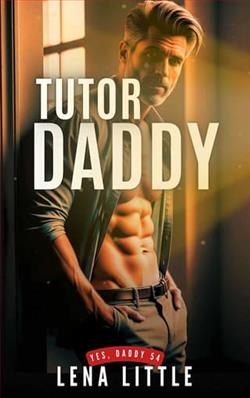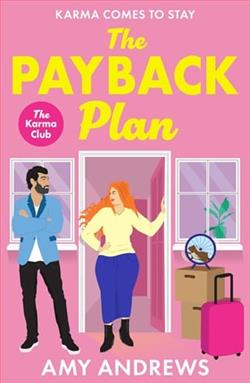Page 19 of Stone
He took stock of his head, and while the dull ache still hovered behind his eyes, it had eased. Once he had a break from the screen—and food in his stomach—he’d be good to go again.
“It helped,” he said, tipping his head even farther back. “Thank you.” He reached up and slid his hands behind her neck, pulling her lips close to his. Her hair fell around them, blocking out the rest of the world. The scent of something vaguely tropical but not fruity teased his nose. Her lips parted, and her pupils dilated as her blue eyes fixed on his.
Slowly, giving her every chance to say no, he pulled her closer. Her lips touched his, and all rational thought fled. Only their soft warmth and the fact that Juliana Morganstern was kissing him mattered. Easing her back, he brought her in close again, shifting his attention to the corners of her mouth, then to her cheek and jawline. Their position didn’t accommodate a deeper kiss, but he didn’t mind. He wanted that, of course. And judging by the way Juliana leaned into him—over him—she did, too. But he liked these sweet, almost innocent, touches.
A shout down the hallway startled her, and she straightened. The loss of contact stung, easing only when he reminded himself that there’d be more when the time was right.
“Thank you,” he said.
She smiled down at him. “Thank you,” she replied, with a slight emphasis on “you.”
He chuckled, then rose. “You ready for food? Dottie left chicken salad in the fridge, and there’s fresh bread from Bun Times.”
“Oh yes, food. Right,” she said with a self-deprecating eye roll. Then with a nod to her computer, she added, “Sandwiches with a side of murdering criminals.”
He looked down, then picked up his notebook with a huff. “Yes, let’s not forget about them.”
11
“You first,” Monk said once they were back in the atrium, each with a plate of food. Juliana eyed the biggest sandwich she’d ever seen that Simon had made for her, but her attention drifted to the chocolate cake. The scent of dark sweetness called to her. As cliché as it was, she was a woman with a thing for chocolate. Growing up, sweets hadn’t been allowed, so her wild rebellions took the form of using what little money she had to buy contraband chocolate bars. Yes, she adored the distinct flavor, but it also tasted like freedom and dissent and a little bit of sin.
Simon reached out and slid her sandwich out of the way, replacing it with the chocolate cake. She glanced over. He winked. “You only live once.”
Bubbles of joy burst through her. Once again, he wanted her to just enjoy something she enjoyed. It might be a small thing to everyone else, but not to her.
His gaze held hers until Monk drummed his fingers on the table. Simon cleared his throat and looked away. She dragged her attention to the man sitting across from them, his sandwichin hand and an expectant look on his face. Philly was blissfully filling his mouth with a handful of potato chips.
“Why don’t you go first,” Monk repeated.
“Right,” she said, picking up a fork in one hand and bringing up her notes with the other. “Aaron Lowery was born in the Bay Area, Richmond to be specific, to a lower-income family. His mother was a grocery store checker, his father a laborer for a yard maintenance company. No apparent issues in Lowery’s childhood other than living barely above poverty.
“College wasn’t an option for him, so he enlisted in the army, joining right after high school graduation. He served eight years, a part of that during Operation Desert Storm, then chose not to reenlist. He returned to California where he obtained his bachelor’s degree from San Francisco State, then his law degree from what was then UC Hastings School of Law and is now UC San Francisco Law.”
“Funded by the GI bill?” Philly asked before taking a ginormous bite of his sandwich. She gaped. He continued chewing as if he hadn’t just impersonated a reticulated python. With a shake of her head, Juliana paused and took a bite of her new favorite cake—it had the perfect balance of bitter and sweet and the ideal ratio of cake to frosting.
“Just curious,” Philly added when he was able to talk again. “He didn’t have money for school before enlisting, and eight years in wouldn’t have earned him enough either.”
Simon shrugged. “He might have taken loans. I think we can all agree that being deployed can change your perspective on life. After being in Desert Storm, maybe he decided loans were worth taking on to have a different kind of life.”
“How’d he become a supervisor?” Monk asked, bringing her back to her readout.
“He worked through college and law school. Although, to Philly’s point, not enough to pay for tuitionandroom and board. He started in the planning commission as an admin?—”
“In San Francisco?” Monk asked.
She nodded. “Made his way up the chain, so to speak. By the time he graduated from law school, he had enough contacts to get hired into the city attorney’s office. Not as a city lawyer at first, but after a few years, they promoted him. And kept promoting him until he decided to run for office at the age of forty-two. He’s been in office ever since, and he’s sixty-one this year.”
“What’s his record?” Philly asked. “Did he piss anyone off?”
“Nothing obvious we could find,” Simon answered, taking over and giving her a chance to eat her sandwich now that she’d finished her cake.
“He’s a bland guy,” he continued. “The type of politician who gets enough of the right things done to keep getting reelected but doesn’t ever do anything groundbreaking or controversial. His district doesn’t include the more challenging parts of the city, so he can evade direct responsibility for tackling those issues. He does like to be out and about, though.”
“Meaning?” Monk asked.
“He’s very public. We found a lot of pictures of him at city events, fundraisers for popular charities, opening night at the opera, those sorts of things. More so than other supervisors,” Simon answered.
“Where does he live?” Philly asked.















